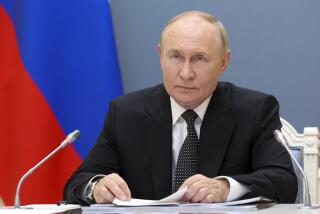Russia’s Resurgent Enemy Within
- Share via
The official announcement came, appropriately, in the middle of the night: Russian President Boris N. Yeltsin had signed legislation passed by Parliament in late February to greatly broaden the powers of the Federal Security Service, successor to the KGB.
The new law allows warrantless searches, legalizes electronic surveillance and permits personal mail to be opened. It further grants the security service--its Russian initials are FSB--authority over foreign intelligence gathering. The FSB thus seems to be well on the way to becoming the KGB redux, further weakening Russia’s experiment with democracy.
Concerns of democrats and civil libertarians over expanding the state’s police powers had little chance of prevailing in an unsettled political climate made all the more volatile by exploding fear over pervasive lawlessness and corruption. Organized crime controls or parasitically sucks profits from much of the country’s private business activities, and the new criminal entrepreneurs flaunt their wealth and power. Street hoodlums prey on ordinary citizens. Those who denounce criminal gangs may literally pay with their lives. Many, even legislators, have been murdered for daring to oppose spreading criminality.
Violent crime, at least of the non-state variety, was unusual in the Soviet Union, thanks to a pervasive police presence and a readiness to use the most severe measures to repress and punish. That there is a general readiness to re-empower a potentially highly repressive internal security force indicates how encompassing fears raised by the post-Soviet crime wave have become. Not for the first time in history, a lot of Russians seem ready to trade a large measure of personal liberty for the promise of a more controlled social order.
The virtually automatic response of police organs freed from accountability and restraints is to use power to the fullest. In a country like Russia, where civil liberties have been all but unknown, the temptation to abuse power is strong. Yet Russia’s hopes for democracy--and the West’s hopes for a stable and responsible Russia--can succeed only under the rule of law. Crime in Russia unmistakably imperils civil order--but the potential return to police state repression in response to that danger has to be seen as no less a threat to the rule of law and to Russia’s democratic evolution.
More to Read
Sign up for Essential California
The most important California stories and recommendations in your inbox every morning.
You may occasionally receive promotional content from the Los Angeles Times.










